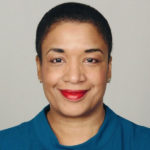Annual Meeting 2024: Expectations and Anticipation

By Risha RaQuelle

As I reflect on AAG’s work from last year’s annual meeting to this year’s, one word of many come to mind: Transition.
We, members, leaders, and staff of AAG, are living and enduring many transitions, both globally and locally. Yet these transitions require us to continue momentum: Momentum in our reflection and commitment to our core value systems and in our collective call to action through our research, teaching, and service.
It is hard enough to effect transition in the institutions, systems, and ethical frameworks in which we operate. Added to this are the personal and professional transitions always churning in our own lives, sometimes all at once. It can be hard to see a clear dividing line for some, as for example the campuses and organizations where we work experience challenges and shocks to their traditional ways of doing business, challenges in which we too can be caught up.
None of our efforts are possible without you. We are grateful for your partnership.
Opportunities to Get Involved
The annual meeting offered us numerous opportunities to elevate our voices, particularly within the framework of research and scholarship. A throughline is the set of opportunities to partner with AAG in research and to elevate a care ethic in research, particularly at institutions that sometimes have challenges to their ability to compete with larger R1 institutions. Here are just a few possibilities for you to get more involved in effecting this kind of change in our discipline:
- Request for Partnerships (RFP). We hosted a session and a set of workshops to acquaint participants in the new AAG Request for Partnerships initiative, as a direct result of our commitment to care in the academy and our collective community at the AAG. The first formal RFP is active through August 5, and focused on targeted mentoring networks. Learn more and apply.
- Convening of Care. Culminating in a forum of 30 participants in September, the Convening aims to shift the presumptive practices of the research enterprise toward policies and systems informed by an ethos of care. Although the first open round for participation closed May 1, we continue to seek applicants representing specific cohorts of experience among researchers. Find out more.
One of the most valuable discussions that grew from our sessions were the observations of participants who pointed out gaps in our proposed approach, which does not explicitly acknowledge how often a precipitating event creates the need to consider and enact a care ethic. Care is an act of benevolence, but more than that, it is an act of concern that stems from a root cause that has revealed an uncaring environment. As participants observed, a precipitating event is often the catalyst toward creating a caring environment. These are what I call critical incidents. These critical incidents are lived experiences that scholars and professionals experience as they navigate access to organizational or institutional resources. In our discussions at AAG 2024, this was illuminated by participants who shared their lived experiences during the session, including experiences they have had at the AAG.
Our Core Value of and Ethos of Care
This discussion of care, what it means and how best to bring it to the foreground, brings us back to our association, our membership, our community of values in geography, the value of membership, convening, and collective action. Beyond the career advancement, networking, and ability to stay apprised of development in the field, being part of AAG offers the possibility–the beauty—of making an impact in the work we each do.
In the wake of an amazing meeting, meeting new people and current colleagues both virtually and in person, I ask that you continue to reach out. Continue to show up. Continue to respond to the calls to actions.
Specifically, we will seek new members for the JEDI Committee and its seven TLC-GRAM subcommittees. Find out more about what we are doing, what we aim to do, and how your vision can be integrated into that work.
Our commitment is to be intentional about identifying timelines for engagement and involvement. By this meaning, when we ask for your service, we will set deadlines for completion of that service and apply our own principles of care to the whole person you bring to the work. We understand that all of us are being pulled in many fruitful and challenging directions. We strive to respect your time with respect to these efforts.
With many thanks and inspiration, as I close out this column and continue to issue the call to action and collaboration.
The AAG Culture of Care column is an outreach initiative by the AAG JEDI Committee. Don’t forget to sign up for JEDI Office Hours. The current theme of Office Hours is An Ethos of Care in the Research Enterprise.

 Often underemphasized in higher education is the important role played by community colleges, which continue to be responsible for the education of 38% of all American undergraduates enrolled in public colleges and universities. Although
Often underemphasized in higher education is the important role played by community colleges, which continue to be responsible for the education of 38% of all American undergraduates enrolled in public colleges and universities. Although  AAG is proud to welcome a graduate fellow who will be assisting in the planning and implementation of the Convening of Care, taking place in Washington, D.C., September 19-20, 2024. We would like to extend a warm welcome to Shaun Johnson.
AAG is proud to welcome a graduate fellow who will be assisting in the planning and implementation of the Convening of Care, taking place in Washington, D.C., September 19-20, 2024. We would like to extend a warm welcome to Shaun Johnson.